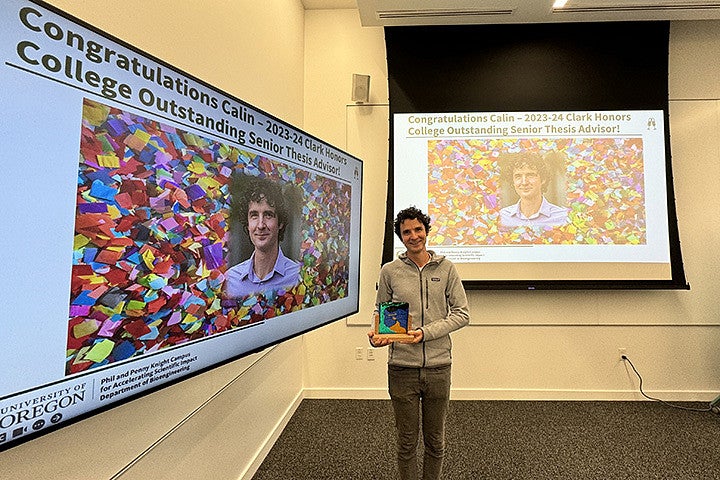
A great mentor can change the course of a student’s life.
For Carmen Resnick, that mentor was Assistant Professor Calin Plesa. Resnick started working in the Plesa Lab as a UO undergraduate in December 2020, where she learned basic skills and how to collect data, which in turn strengthened her application the following year to the Knight Campus Undergraduate Scholars (KCUS) program.
“Working with Professor Plesa has been life changing for me,” Resnick said in a nomination letter submitted for the Clark Honors College Excellence in Thesis Advising Award, which Plesa recently won. “(He) made me so excited about the science I was studying and gave me purpose in getting through my difficult classes.”
Resnick — who graduated in 2023 and now works as a researcher for the San Francisco startup Octant Bio — went on to praise Plesa In her nomination letter for his intellect and for the encouraging atmosphere he created in his lab.
“The lab environment is consistently supportive and comfortable. I have never felt out of place,” Resnick wrote. “(Plesa) also happens to be the smartest person I have ever met, his intellect radiates through the building, but I have never felt like he thinks less of me for not knowing something.”
Plesa received the award during a surprise presentation by Carol Stabile, the Clark Honors College dean, during a Department of Bioengineering faculty meeting. The award recognizes faculty members who provide exceptional commitment to mentoring Clark Honors College students, including offering feedback and guidance on research activities, coaching on defense presentations, providing research and professional opportunities and assisting in development of research or career readiness skills.
“Receiving the thesis mentoring award was incredibly gratifying,” Plesa said. “It's always fulfilling to see the impact of mentorship on a student's academic and personal growth. It’s also a huge motivation for me to continue fostering a supportive learning environment for my students.”
The Plesa Lab also received a 2023 Knight Campus Recognition Award in the category of Innovation and Impact. The award committee singled out Plesa for artfully harnessing a lab group with a wide range of disciplines and propelling them forward with innovation research projects and translational objectives.
“As a PI and mentor, Calin has been dedicated to pushing the boundaries of knowledge with an ability to translate that knowledge into practical applications,” the committee wrote. “He is noted for his instructional skill at breaking down difficult concepts, and his research program is decidedly creative and innovative.”
The committee also singled Plesa out for the mentorship he provided to the UO’s iGEM team, an undergraduate group that competed internationally in a synthetic biology competition along with hundreds of student teams from around the globe. The UO team took silver prize in the Therapeutics category at the iGEM Grand Jamboree in Paris, and was nominated for the Best Software Award.
Plesa joined Knight Campus in 2019 and is focused on improving and lowering the cost of gene synthesis — which is used in nearly all areas of life sciences research, including studies on how mutations influence disease development and the development of new therapeutics. He co-developed a method called DropSynth, which allows the generation of large libraries of thousands of genes and functional testing of many possible mutations at relatively low cost.
A decade before joining the Knight Campus, Plesa competed in iGEM himself as a student. He says the project-based nature of both iGEM and KCUS forces students to learn and integrate new things very quickly, an ability that translates to just about any subject and career.
“I’ve found that one of the most crucial things to learn is actually how to learn,” Plesa said. “What you may need to know for a research project changes all the time, so it’s crucial to be able to pick up new skills and information quickly.”
Learn more about Plesa Lab at Knight Campus.
